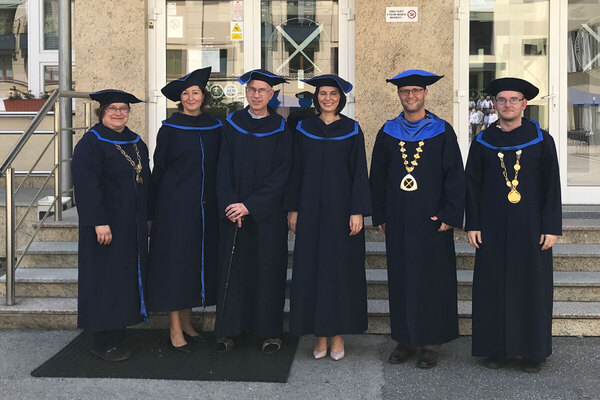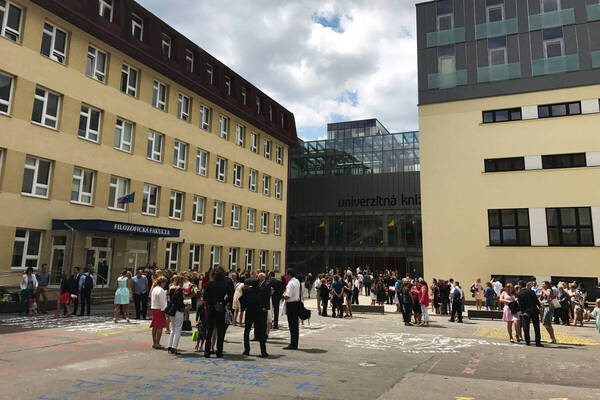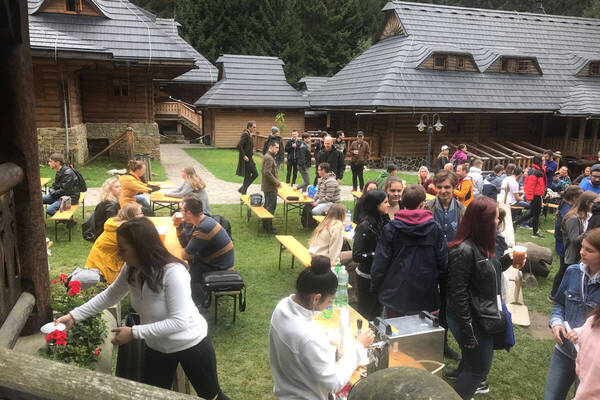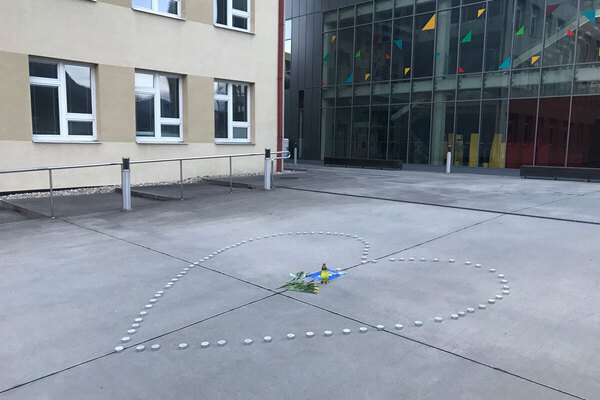
Marek Babic is associate professor and dean of the Faculty of Arts and Letters at the Catholic University in Ružomberok, Slovakia. He was a visiting scholar at the Nanovic Institute for European Studies at the University of Notre Dame in May 2009. In June 2022, he participated in the Advanced Leadership Program in Rome, facilitated by the Catholic Universities Partnership, an initiative of the Nanovic Institute.
I am one of the first employees of the Catholic University in Ružomberok, and therefore I know intimately its modest beginnings 22 years ago. I have experienced its dynamic and rapid growth and I have witnessed many academic successes and failures, both human and institutional. I started among the lowest academic positions, became the chairman of the Academic Senate of the Faculty of Arts and Letters, and have now spent seven years as this faculty’s dean.
I know the history of our young university, having experienced its growth firsthand and, having been in the management structures, I have seen in depth how its system functions. A person who sees and understands the most essential structures and functions of any institution's functioning is rarely an optimist.
It is therefore necessary for an experienced leader to remember the principles and main mission of the university. Only in this way is it possible to avoid skepticism, believe in progress, and carry activities out in the right direction. I received this inspiration from my participation in the Catholic Leadership Program at the University of Notre Dame in 2017. Among other stimulating activities, I was impressed by a brilliantly thought-out and detailed presentation on organizational evaluation by Salvatore Alaimo, an associate professor of nonprofit management at Grand Valley State University. The basic message of the lecture, if I understood it well, was to emphasize the need to constantly think about what we do, how we do it, where we are going, and where we want to go.
In 2020, the Slovak government announced plans for implementing a “quality system” at the country's universities, including at the Catholic University in Ružomberok, which provoked the leadership of our university to undertake the reflections suggested by Professor Alaimo. Over the past two years, we have created many tables, graphs, statistics, analyses, and evaluations. As I studied them carefully, I gradually noticed one priority emerging above all — the students.

In its Long-Term Plan (2022-2027), the Catholic University of Ružomberok defined the Mission Statement of KU: “We shape the minds and heart: in the spirit of the Catholic moral, intellectual, and academic tradition, we provide university education and upbringing and carry out research for the integral development of man and the good of the whole society.” In addition to the mission, the university has defined four basic values: truth, unity, professionalism, and responsibility.
I would very much like to share my personal experience, which reflects my perspective on working and cooperating with students in light of our university’s basic principles. As a leader facing great challenges in a region with a serious demographic crisis, I have come to believe that one of our primary tasks is to create and develop a meaningful and dynamic community of teachers and students, or in Latin: Universitas magistrorum et scholarium. This is actually a return to the deepest roots of the concept of a university in the Western world.
Creating the Student College
Inspired by my colleagues and experts who lectured at the Catholic Leadership Program, I created the Student College, an institute that has no parallel within the Catholic University of Ružomberok. The college consists of student representatives from each department and faculty management. The goal of the Student College is to involve students in decision-making processes at the faculty. From my point of view, the Student College is the best expression of the four basic values of our university.
The truth: At meetings with students, we discuss the successes and failures of the faculty and we consider difficulties in education. We are open to honest debate and address student complaints. On the other hand, we, from the faculty management, are not afraid to admit many problems in how things are run and, together with the students, we look for solutions. Sometimes we may risk upsetting the students, but fidelity to the truth is paramount in our discussions with students. I believe that it leads our community of teachers and students to even greater cohesion.
Unity: Revealing the truth at Student College meetings strengthens the unity of our academic community. We can bond more and encourage joint activities. We organize activities to promote our faculty in communication media and social networks. In our most recent meeting, the students came up with the initiative to create a media campaign for the Open Door Day. Students designed new posters, created new hashtags, and are preparing to produce short videos and interviews. As a special expression of our unity — our community of teachers and students — there is an informal matriculation for freshmen whereby older students prepare a program to welcome first-year students with a presentation of “Decrees” to mark their acceptance into the community. These are usually very pleasant events where we enjoy beer and barbecue and students and teachers compete in football matches and general knowledge quizzes.

Professionalism: Our students help us evaluate the quality of teaching at the Catholic University of Ružomberok, which leads to regular improvement of the faculty’s pedagogy. Those teachers who receive bad evaluations from students must make corrections after talking to the dean of the faculty. The students help us create evaluation questionnaires and we discuss appropriate questions together.
Responsibility: Students from the Student's College and beyond sometimes come up with an initiative that testifies to the meaning of doing good with the best of intentions. They demonstrate that they respect the principles of solidarity. These are the moments when I am especially proud of our students. On February 24, 2022, when Russian troops invaded Ukraine, they spontaneously organized a large gathering of the academic community, which took place that day, in support of our Ukrainian students. We sang the Ukrainian national anthem and made a big heart out of candles on the ground. In December of this year, our students joined in the support of oppressed women in Iran. A student from Iran testified at a gathering of the academic community about the difficult conditions in Iranian society and brutal police interventions against protesters in Iranian cities. Thanks to our students, the Catholic University in Ružomberok joined the global movement called Campus Rally for Iran.

In an extremely difficult period, when our faculty faced several challenges at once — financial, accreditation, and demographic — students from the Student College came to my office. They brought with them a homemade cake and invited me to spend time with them in cheerful communication. They saw that I was struggling, they knew my worries and therefore decided to please me with their presence. It was a simple but very effective gesture of friendship and belonging. Nothing else at that time brought me more encouragement and strength for future battles. More than ever before, I realized how important it is to build a community of teachers and students. In my opinion, this is the basic principle of the university, on which the future of higher education can be built.
Originally published by at crossingthesquare.nd.edu on January 13, 2023.